
 |
||||||
|
GAY
FILM REVIEWS BY MICHAEL D. KLEMM
|
||||||
|
Jeffrey MGM
Video, Director:
Screenplay: Starring: Rated R, 92 minutes |
Safest
Sex
In 1993, playwright Paul Rudnick's Off-Broadway hit, Jeffrey, took a decidedly different approach towards depicting gay men and AIDS; it was written as a comedy. |
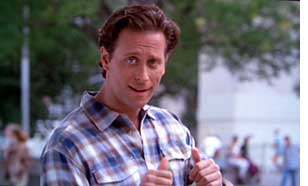 While
this might sound tasteless, Jeffrey was
a much needed antidote at the time to the climate of death that had permeated
gay culture for most of the previous decade. The play resonated with audiences
and, two years later, it was adapted for the screen by Rudnick himself.
The film, helmed by the play's original director, Christopher Ashley, featured
an A-list cast augmented by a treasure trove of celebrity cameos. While
this might sound tasteless, Jeffrey was
a much needed antidote at the time to the climate of death that had permeated
gay culture for most of the previous decade. The play resonated with audiences
and, two years later, it was adapted for the screen by Rudnick himself.
The film, helmed by the play's original director, Christopher Ashley, featured
an A-list cast augmented by a treasure trove of celebrity cameos. |
|
|
|
|
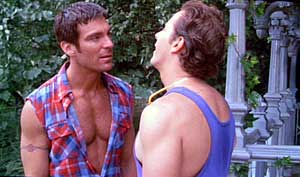 ...and
immediately meets Steve (Michael T. Weiss). Steve is everything that Jeffrey
has always wanted in a man but, because he has vowed to give up sex, he
panics and makes a quick exit stage left. But they meet cute again. Steve
is persistent and eventually wins Jeffrey over - until he discloses that
he is HIV positive. Jeffrey's worst fear is realized and he retreats into
his cocoon again. ...and
immediately meets Steve (Michael T. Weiss). Steve is everything that Jeffrey
has always wanted in a man but, because he has vowed to give up sex, he
panics and makes a quick exit stage left. But they meet cute again. Steve
is persistent and eventually wins Jeffrey over - until he discloses that
he is HIV positive. Jeffrey's worst fear is realized and he retreats into
his cocoon again. |
|
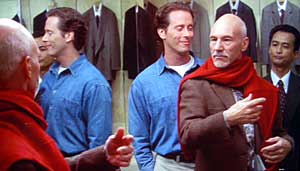 The
very scenario that he fears is embodied by his two best friends. Patrick
Stewart (I, Claudius, Star Trek: The Next Generation) plays Sterling,
an ascorbic interior decorator who is always ready with an Oscar
Wildean bon mot for every occasion. Sterling is a catty queen but he
also has a big heart. He urges Jeffrey to find a boyfriend. His younger
lover is Darius (Bryan Blatt), a dancer who is appearing in Cats.
Darius is also HIV positive. Sterling maintains a healthy attitude about
the situation and tells Jeffrey that they still have sex - "Safe sex. The
best." But he is also being a bit delusional ("You are not going to get
sick," he tells Darius. "I thought I made that clear.") and his
words do nothing to assay Jeffrey's ultimately selfish terror of living
with such a man and eventually having to watch him die. The
very scenario that he fears is embodied by his two best friends. Patrick
Stewart (I, Claudius, Star Trek: The Next Generation) plays Sterling,
an ascorbic interior decorator who is always ready with an Oscar
Wildean bon mot for every occasion. Sterling is a catty queen but he
also has a big heart. He urges Jeffrey to find a boyfriend. His younger
lover is Darius (Bryan Blatt), a dancer who is appearing in Cats.
Darius is also HIV positive. Sterling maintains a healthy attitude about
the situation and tells Jeffrey that they still have sex - "Safe sex. The
best." But he is also being a bit delusional ("You are not going to get
sick," he tells Darius. "I thought I made that clear.") and his
words do nothing to assay Jeffrey's ultimately selfish terror of living
with such a man and eventually having to watch him die. |
|
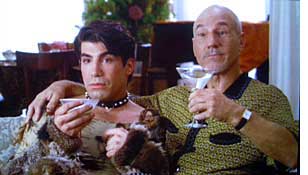 As
Jeffrey ponders the meaning of life, the universe and everything, playwright
Rudnick skewers every gay stereotype under the sun and pokes fun at all
the staples that had become cliches in gay drama. Much of the humor is brilliant.
The copious comic settings and situations include a hoedown for AIDS, bogus
self help groups, queer vigilantes, an amorous priest and a Gay Pride Parade.
No sacred cow escapes Rudnick's finely tuned barbs and Jeffrey
is often very, very funny. At a memorial service, Jeffrey is shocked to
realize that he's crusing one of the mourners. Sterling moans "Oh please
- everybody is" while Darius announces that he wants Liza at his
memorial and the cast of Cats to sing "Darius, we all thought you
were fabulous" to the tune of "Memories." As
Jeffrey ponders the meaning of life, the universe and everything, playwright
Rudnick skewers every gay stereotype under the sun and pokes fun at all
the staples that had become cliches in gay drama. Much of the humor is brilliant.
The copious comic settings and situations include a hoedown for AIDS, bogus
self help groups, queer vigilantes, an amorous priest and a Gay Pride Parade.
No sacred cow escapes Rudnick's finely tuned barbs and Jeffrey
is often very, very funny. At a memorial service, Jeffrey is shocked to
realize that he's crusing one of the mourners. Sterling moans "Oh please
- everybody is" while Darius announces that he wants Liza at his
memorial and the cast of Cats to sing "Darius, we all thought you
were fabulous" to the tune of "Memories." |
|
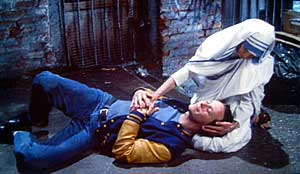 However,
what works on stage doesn't always work on screen. The fourth wall is repeatedly
broken down, a common device on stage, whenever Jeffrey addresses the audience.
This is okay in a film when there's only one narrator but it's a mistake
when others deliver monologues as well. The frequent appearances of Mother
Theresa are also more anachronistic, and just a little weirder, on film.
In the most glaring example of what should never be done on screen,
Jeffrey is chased down the streets of New York by his friends and a horde
of strangers who badger him and then break into applause when he finally
agrees to a date with Steve. You don't do that in cinema, you do it in sitcoms. However,
what works on stage doesn't always work on screen. The fourth wall is repeatedly
broken down, a common device on stage, whenever Jeffrey addresses the audience.
This is okay in a film when there's only one narrator but it's a mistake
when others deliver monologues as well. The frequent appearances of Mother
Theresa are also more anachronistic, and just a little weirder, on film.
In the most glaring example of what should never be done on screen,
Jeffrey is chased down the streets of New York by his friends and a horde
of strangers who badger him and then break into applause when he finally
agrees to a date with Steve. You don't do that in cinema, you do it in sitcoms. |
|
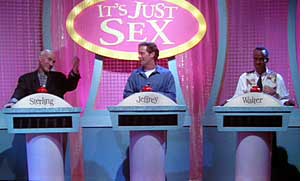 Film,
by its very nature, usually demands a semblance of realism and many of Rudnick's
plays are, at times, little more than a series of sketches tied together
by an underlying theme. This was also true of parts of The Most Fabulous
Story Ever Told, Valhalla and The New Century and this shortcoming
is quite evident in the film version of Jeffrey.
While most of it is unquestionably funny, there isn't
always a cohesive narrative. Some film versions of plays would benefit from
someone other than the original stage director standing behind the camera.
Jeffrey isn't alone, look at
the recent film version of The Producers. Film,
by its very nature, usually demands a semblance of realism and many of Rudnick's
plays are, at times, little more than a series of sketches tied together
by an underlying theme. This was also true of parts of The Most Fabulous
Story Ever Told, Valhalla and The New Century and this shortcoming
is quite evident in the film version of Jeffrey.
While most of it is unquestionably funny, there isn't
always a cohesive narrative. Some film versions of plays would benefit from
someone other than the original stage director standing behind the camera.
Jeffrey isn't alone, look at
the recent film version of The Producers. |
|
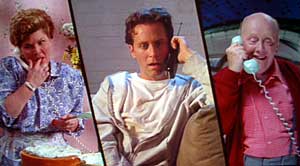 Still,
the film is not without its many charms and there are laughs aplenty. You
watch Rudnick for the jokes and he is one of the masters. When Steve offers
to spot for Jeffrey, on their first meeting at the gym, the line between
bench pressing and sex become hilariously blurred. Rudnick pokes fun at
straight audience reactions when Steve gives Jeffrey a big kiss and the
action cuts to a movie theater where two teen-aged boys begin to scream
in disgust while their girlfriends sigh with romantic approval. In one of
the best scenes, Jeffrey calls his parents and ponders what it would be
like if you could really talk to them about your problems. He tells
them that he has given up sex and, shocked, they offer advice such as "What
about a jerk-off club," "Have you explored masturbation" and "We like that
new Jeff Stryker film, Powertool II." Still,
the film is not without its many charms and there are laughs aplenty. You
watch Rudnick for the jokes and he is one of the masters. When Steve offers
to spot for Jeffrey, on their first meeting at the gym, the line between
bench pressing and sex become hilariously blurred. Rudnick pokes fun at
straight audience reactions when Steve gives Jeffrey a big kiss and the
action cuts to a movie theater where two teen-aged boys begin to scream
in disgust while their girlfriends sigh with romantic approval. In one of
the best scenes, Jeffrey calls his parents and ponders what it would be
like if you could really talk to them about your problems. He tells
them that he has given up sex and, shocked, they offer advice such as "What
about a jerk-off club," "Have you explored masturbation" and "We like that
new Jeff Stryker film, Powertool II." |
|
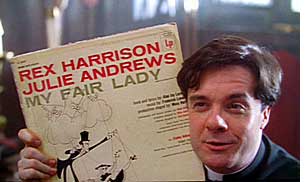 Counsel
also comes from the strangest places. Sigourney Weaver plays a ditsy New
Age Evangelist who preaches unconditional love so that you can find the
strength to say "FUCK YOU! Get out of my house until you stop drinking!"
Nathan Lane appears as a horny and show-tune
loving priest who tells Jeffrey that "there is only one real blasphemy -
the refusal of joy... When did despair become enjoyable? Grief, yes; tears,
of course. But terminal gloom? Who does that help? Even Brecht wrote musicals." Counsel
also comes from the strangest places. Sigourney Weaver plays a ditsy New
Age Evangelist who preaches unconditional love so that you can find the
strength to say "FUCK YOU! Get out of my house until you stop drinking!"
Nathan Lane appears as a horny and show-tune
loving priest who tells Jeffrey that "there is only one real blasphemy -
the refusal of joy... When did despair become enjoyable? Grief, yes; tears,
of course. But terminal gloom? Who does that help? Even Brecht wrote musicals." |
|
| The scene with the priest, besides being funny, is very important. Here is a good example of why Rudnick has always been so popular. Look at how well he is able to incorporate a lifetime of queer experience and sensibility into his writing and convey a mood that is both touching and humorous: | |
|
|
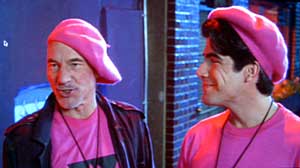 The
cast of Jeffrey is terrific.
Steven Weber threw himself into the lead role and it is obvious that he
was having a lot of fun with it. Michael T. Weiss is suitably butch and
hot as Steve but he sometimes needs to loosen up a bit. Patrick Stewart,
on the other hand, steals every scene in which he appears as Sterling and
he gets most of the best lines. Stewart camps it up just enough to be delightful
without going over the top. His high-spirited, and sometimes deadpan, delivery
saves even the silliest scenes. At the Pride Parade, he is asked what group
he is marching with and replies, "Gay Men Who Need A Cigarette." During
a game show fantasy ("It's Just Sex" with host Skip Winkly) his reply to
a question about what seemingly harmless events can now be fatal during
sex is "fluorescent lighting." This might have been more of an issue back
in 1995, but Stewart is such a versatile actor that I didn't think of Star
Trek: TNG's Captain Jean Luc Picard once when I first watched
the movie. The
cast of Jeffrey is terrific.
Steven Weber threw himself into the lead role and it is obvious that he
was having a lot of fun with it. Michael T. Weiss is suitably butch and
hot as Steve but he sometimes needs to loosen up a bit. Patrick Stewart,
on the other hand, steals every scene in which he appears as Sterling and
he gets most of the best lines. Stewart camps it up just enough to be delightful
without going over the top. His high-spirited, and sometimes deadpan, delivery
saves even the silliest scenes. At the Pride Parade, he is asked what group
he is marching with and replies, "Gay Men Who Need A Cigarette." During
a game show fantasy ("It's Just Sex" with host Skip Winkly) his reply to
a question about what seemingly harmless events can now be fatal during
sex is "fluorescent lighting." This might have been more of an issue back
in 1995, but Stewart is such a versatile actor that I didn't think of Star
Trek: TNG's Captain Jean Luc Picard once when I first watched
the movie. |
|
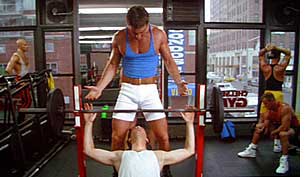 Jeffrey
is a very mixed film but it is nonetheless essential viewing. Most of the
flaws I mentioned stand out more on repeated viewings and most should enjoy
Jeffrey for the jokes alone
if nothing else. It feels like one of those uniquely New York Woody Allen
films and this is a good thing. It also feels like a sitcom sometimes too
and the juggler doesn't always keep all the balls in the air. But, as I
said, the film has its charms. The bench pressing scene is hotter than some
porn; the Hoedown for AIDS explodes into Seven Brides For Seven Brothers
mixed with Busby Berkeley and Tom Of Finland; the opening montage of Jeffrey's
last sexual trysts ("It broke," "Let's just cuddle" and "Here's the results
from my blood test a month ago") was daring for its time. Although I have
to admit that it was funnier on stage when each lover was under the covers,
in a large bed, and popped up for their scene like clowns coming out of
a little car. Jeffrey
is a very mixed film but it is nonetheless essential viewing. Most of the
flaws I mentioned stand out more on repeated viewings and most should enjoy
Jeffrey for the jokes alone
if nothing else. It feels like one of those uniquely New York Woody Allen
films and this is a good thing. It also feels like a sitcom sometimes too
and the juggler doesn't always keep all the balls in the air. But, as I
said, the film has its charms. The bench pressing scene is hotter than some
porn; the Hoedown for AIDS explodes into Seven Brides For Seven Brothers
mixed with Busby Berkeley and Tom Of Finland; the opening montage of Jeffrey's
last sexual trysts ("It broke," "Let's just cuddle" and "Here's the results
from my blood test a month ago") was daring for its time. Although I have
to admit that it was funnier on stage when each lover was under the covers,
in a large bed, and popped up for their scene like clowns coming out of
a little car. |
|
|
More
on Paul Rudnick: Steven Weber also
appears in: Nathan Lane also
appears in: Christine Baranski
also appears in: |